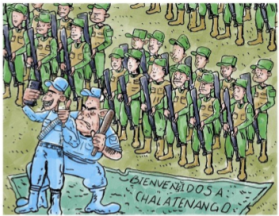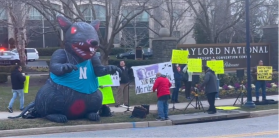US State Department Visits El Salvador, Claims a Seat at Central American summit
On the heels of a US-inspired breakdown at the Summit of the Americas in April, the US claimed its seat as an observer at this weekend's summit of Central American leaders. Secretary of State for Western Hemispheric Affairs Roberta Jacobson attended the 39th meeting of summit of the Central American Integration System (SICA) in Tegucigalpa, Honduras. As it did last summer, the meeting centered around “citizen security” in a region plagued by drug violence created by shifting trafficking routes. "Citizen security" is a keyword in many of the security initiatives that, above all, target the drug trade and historically-corrupt governmental institutions, such as courts and prosecutors' offices. SICA president and de facto leader of Honduras Porfirio Lobo said officials would “consider a new approach to security in Central America, [though] not in isolation." As part of this new approach, the body hosted 150 youth leaders to participate in forums alongside political leaders. But despite the sponsor's association with media conglomerate Televisa – as well as several transnational corporations, the IMF and the Inter-American Development Bank – very sparse reporting of the dialogue has appeared. Just months ago, Latin American governments were raising grave concerns about US political and military intervention under the banner of the drug war, including whether criminalization is the best solution to curbing drug trafficking and use. But objections at the Central American meeting were noticeably absent. Indeed, far from discussions of decriminalization he sought in April, Guatemalan president Otto Pérez Molina urged international donors, like the US, to follow through on its pledges for drug war funding. At the June 2011 SICA summit, Secretary Clinton committed $300 million dollars to fund the Central American Regional Security Initiative (CARSI). “SICA is continuing the projects already prioritized. We will insist once again on the funds that are still to be delivered to us, especially talking about shared [security] responsibility." said Pérez Molina. Secretary Jacobson reaffirmed the US commitment to fund CARSI and pushed for an integrated security strategy, which integrates a broad range of civil society. Before traveling to Tegucigalpa, Jacobson paid visits to El Salvador and Guatemala. In Guatemala, Jacobson toured the headquarters of a humanitarian assistance program run by the US military. And in El Salvador, she gave the police and military a dozen vehicles to be used in counter-drug operations (Check out this opinion piece from Al-Jazeera on why US funds should be re-prioritized toward violence prevention and economic alternatives for youth) The Central American leaders also an "Acuerdo de Asociación" (AdA, or Association Agreement) which includes a free-trade agreement with the European Union (read more analysis and background here)

 "I am a CISPES supporter because continuing to fight for social justice and a more people-centered country means continuing the dream and sacrifice of thousands of my fellow Salvadorans who died for that vision.” - Padre Carlos, New York City
"I am a CISPES supporter because continuing to fight for social justice and a more people-centered country means continuing the dream and sacrifice of thousands of my fellow Salvadorans who died for that vision.” - Padre Carlos, New York City

